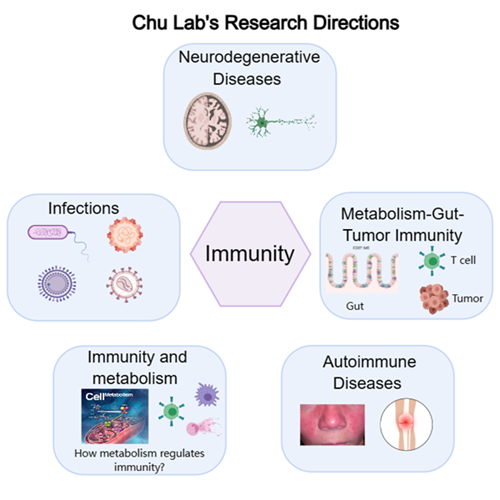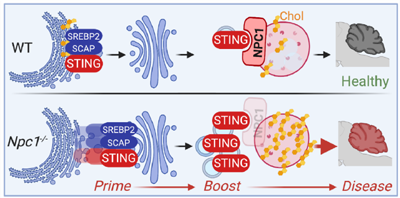
电话:+86-755-86967710
邮箱:webmaster@szbl.ac.cn

Institute of Neurological and Psychiatric Disorders
tingtingchu(at)szbl.ac.cn
Immunology,Molecular Biology,Neuroscience
Junior Principal Investigator
Postdoctoral Fellow
Ph.D, Postdoctoral Fellow
MD
B.S
Innate immune signaling pathways (e.g., cGAS-STING/RIG-I-MAVS, etc.); tumor immunity; neuroimmunology; Metabolism and Immunity.
1) Molecular mechanisms of innate immune signaling pathways and their role in neurological diseases;
2) The role of tumor immunity, especially metabolic and intestinal immunity in tumors, and the development of tumor immunotherapy;
3) The interaction between neuroimmunity and intestinal immunity;
4) Mutual regulation of metabolism and immunity.
Dr. Chu,who has a research background in integrating innate immunity, neurodegenerative diseases and chemical biology, has published 9 high-level papers in Nature, Cell Chemical Biology and other journals as an independent first author. Dr. Chu graduated from Tsinghua University in 2015 with a Ph.D. degree under the tutelage of Prof. Yanmei Li to study the aggregation mechanism and inhibitor development of proteins related to neurodegenerative diseases. She first applied the 'PROTAC' strategy to the degradation of Alzheimer's disease-related Tau protein, which was published in a cover article on Cell Chemical Biology (2016), the invention was awarded a national patent, and Dr. Chu won the "Young Peptide Scientist Award" at the 14th China International Peptide Conference. In 2017, she joined Dr. Nan Yan’s lab in the department of Immunology in University of Texas Southwestern Medical Center for postdoctoral research. She focused on the research of innate immunity, autoimmune diseases, and neuroimmunity. She was particularly interested in the study of cGAS-STING signaling pathway and neuroimmunity. She found that STING signal mediates the neuropathological process of the rare neurodegenerative Niemann Pick disease, type C. This study has discovered novel STING regulators that expand immunologists' understanding of STING biology and constitute a major advance in this field. This study also provided a new understanding of Niemann Pick disease from immune perspective, leading to a new therapeutic target and strategy. This work was published in Nature (2021) as an independent first author. This paper was reviewed by Nature Cell Biology, and featured by BIOART, Bioon, Science Network and other media. Dr. Chu will use multidisciplinary research methods to devote herself to the innate immune signaling pathway; The role and mechanism of innate immunity in
neurodegenerative diseases and autoimmune diseases.


1.Ting-Ting Chu, Xintao Tu, Kun Yang, Jianjun Wu, Joyce J. Repa, Nan Yan. Tonic Prime-Boost of STING Signaling Mediates Niemann-Pick Disease Type C. (2021)Nature596:570–575. (Highlighted byNature Cell Biology)
2. Qian-Qian Li, Yu-Qing Liu, Yun-Yi Luo,Ting-Ting Chu, Na Gao, Pu-Guang Chen, Yong-Xiang Chen and Yan-Mei Li. Uncovering the Pathological Functions of Ser404 Phosphorylation by Semi- synthesis of Phosphorylated TDP-43 Prion-Like Domain.(2020)Chem. Commun.56:5370-5373. PMID: 32281994.
3. Na Gao, Yun-Peng Huang,Ting-Ting Chu, Qian-Qian Li, Bing Zhou, Yong-Xiang Chen, Yu-Fen Zhao and Ya-Mei Li. TDP-43 specific reduction induced by Di-hydrophobic tags conjugated peptides. (2019)Bioorg. Chem. 84:254-259. PMID: 30508770.
4. Na Gao,Ting-Ting Chu, Qian-Qian Li, Yeh-Jun Lim, Tian Qiu, Meng-Zhi-Wen Hu, Xi-Fei Yang, Yong-Xizng Chen, Yu-Fen Zhao and Yan-Mei Li. Hydrophobic tagging-mediated degradation of Alzheimer's disease related Tau. (2017)RSC Adv.7:40362. DOI: 10.1039/c7ra05347a.
5. Lei Shi, Huai Chen, Si-Yu Zhang,Ting-Ting Chu, Yu-Fen Zhao, Yong-Xiang Chen, Yan-Mei Li. Semi-synthesis of murine prion protein by native chemical ligation and chemical activation for preparation of polypeptide- α –thioester.(2017)J Pept Sci.23:438-444. PMID: 28429419.
6.Ting-Ting Chu, Na Gao, Qian-Qian Li, Pu-Guang Chen, Xi-Fei Yang, Yong-Xiang Chen, Yu-Fen Zhao, Yan-Mei Li. Specific Knockdown of Endogenous Tau Protein by Peptide-directed Ubiquitin -Proteasome Degradation. (2016)Cell Chem. Biol.23: 453-461. PMID: 27105281. (Cover article)
7.Ting-Ting Chu, Qian-Qian Li, Tian Qiu, Zhan-Yi Sun, Zhi-Wen Hu, Yong-Xiang Chen, Yu-Fen Zhao and Yan-Mei Li. Clearance of the intracellular high level of tau protein directed by artificial synthetic hydrolase.(2014)Mol. BioSyst.10:3081-3085. PMID: 25308803.
8. Qian-Qian Li,Ting-Ting Chu, Yong-Xiang Chen, and Yan-Mei Li. Tau Protein Associated Inhibitors in Alzheimer Disease. (2014)Chinese Journal of Chemistry. 32:964-968.
Contact
Address: Gaoke Innovation Center,Guangming District, Shenzhen
Phone: +86-755-86967710
Email: webmaster@szbl.ac.cn
Postal Code: 518132
Copyright © 2025 Shenzhen Bay Laboratory. All Rights Reserved.